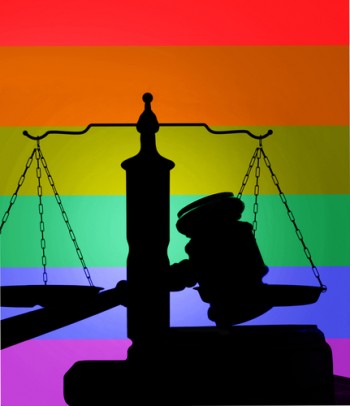Title VII protects gay workers, 7th Circuit rules; Posner backs 'interpretive updating' of old laws

In an opinion praised by gay-rights advocates, an en banc federal appeals court has ruled that Title VII of the Civil Rights Act protects employees from discrimination on the basis of sexual orientation.
The 8-3 decision on Tuesday by the 7th U.S. Circuit Court of Appeals at Chicago highlights differences in statutory interpretation. Should laws be interpreted according to the understanding of a reasonable person at the time of passage, as argued by the dissent? Or, as Judge Richard Posner argued in a concurrence, should judges use “judicial interpretive updating” to give fresh meaning to laws passed long ago?
The majority ruled on behalf of Kimberly Hively, a former math teacher at Ivy Tech Community College in Indiana who said she was denied promotions and fired because she is a lesbian. Publications that covered the decision include the National Law Journal (sub. req.), the Chicago Tribune, the New York Times and the Washington Post. How Appealing links to the opinion (PDF) and additional coverage.
The majority opinion by Judge Diane Wood looked at the ban on sex discrimination in Title VII and concluded it also covers sexual-orientation discrimination. Wood noted that, for years, federal appeals courts have ruled differently. But she said that conclusion needs a fresh look in light of developments in the Supreme Court.
Over the years, Wood said, the ban on discrimination on the basis of sex has been interpreted by the Supreme Court to cover workplace sexual harassment, including same-sex sexual harassment, and harassment on the basis of failure to conform to gender stereotypes. The Supreme Court also has found constitutional protections for gay people in several decisions, including the Obergefell v. Hodges decision finding a right to marry.
“It is therefore neither here nor there,” she wrote, that Congress “may not have realized or understood the full scope of the words it chose” when it passed the Civil Rights Act in 1964.
Hively had argued that, had she been a man married to a woman, she would not have been fired. “This describes paradigmatic sex discrimination,” Wood wrote. According to Hively’s allegations, “Ivy Tech is disadvantaging her because she is a woman.”
In a concurrence, Posner said he would prefer that the court acknowledge openly that it is adopting a new meaning of sex discrimination by reinterpreting the half-century-old statute.
Posner argued for a method of statutory interpretation that he called “judicial interpretive updating” that gives fresh meaning to statements in older statutes and constitutional text. Such an interpretation can give statutes passed long ago a “meaning that infuses the statement with vitality and significance today,” he wrote.
When the Civil Rights Act was passed, it was “well-nigh certain that homosexuality, male or female, did not figure in the minds of the legislators,” Posner said. “They shouldn’t be blamed for that failure of foresight. We understand the words of Title VII differently not because we’re smarter than the statute’s framers and ratifiers but because we live in a different era, a different culture.”
Judge Diane Sykes, who was on President Donald Trump’s list of potential Supreme Court nominees, wrote the dissent. She said Hively was treated unjustly if she was denied a job because of her sexual orientation, but Title VII doesn’t provide a remedy.
Sykes said the statute should be interpreted, as a reasonable person would have understood it when adopted. The majority, however, “deploys a judge-empowering, common-law decision method that leaves a great deal of room for judicial discretion,” she wrote.
“The result is a statutory amendment courtesy of unelected judges,” Sykes wrote. “Judge Posner admits this; he embraces and argues for this conception of judicial power. The majority does not, preferring instead to smuggle in the statutory amendment under cover of an aggressive reading of loosely related Supreme Court precedents. Either way, the result is the same: the circumvention of the legislative process by which the people govern themselves.”
The majority opinion is at odds with a March 10 decision by the 11th U.S. Circuit Court of Appeals at Atlanta, which found no Title VII protection for sexual orientation. A different federal appeals court, the 2nd U.S. Circuit Court of Appeals at New York, also ruled in a March 27 opinion that Title VII doesn’t specifically ban sexual-orientation discrimination, although the court allowed the plaintiff to sue for discrimination based on failure to conform to gender stereotypes.
Ivy Tech said in a statement that it won’t ask the Supreme Court to hear the case. The school said it already bans discrimination against gay people, and it didn’t discriminate against Hively. The school plans to defend the case on the merits when it returns to the trial court.



